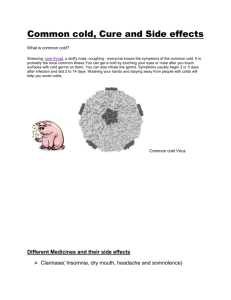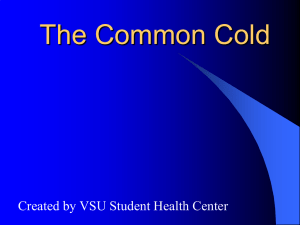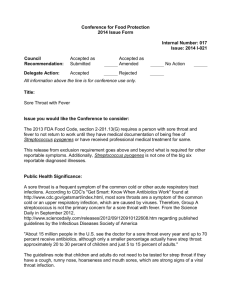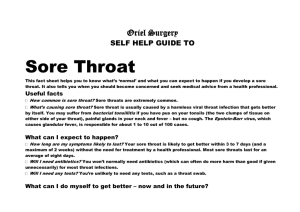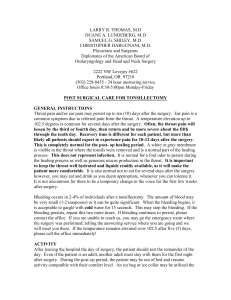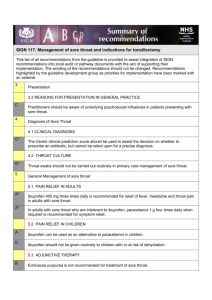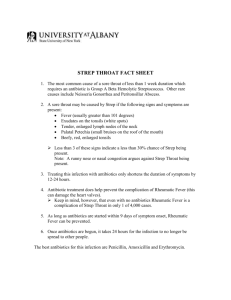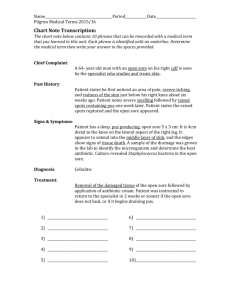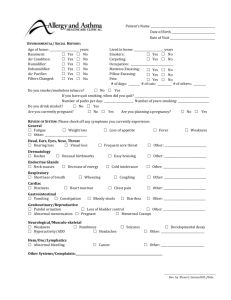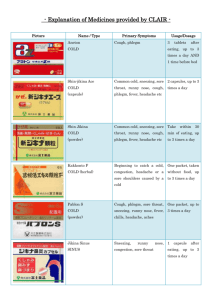Autumn 2011Newsletter - Beaumont Lodge Medical Practice
advertisement
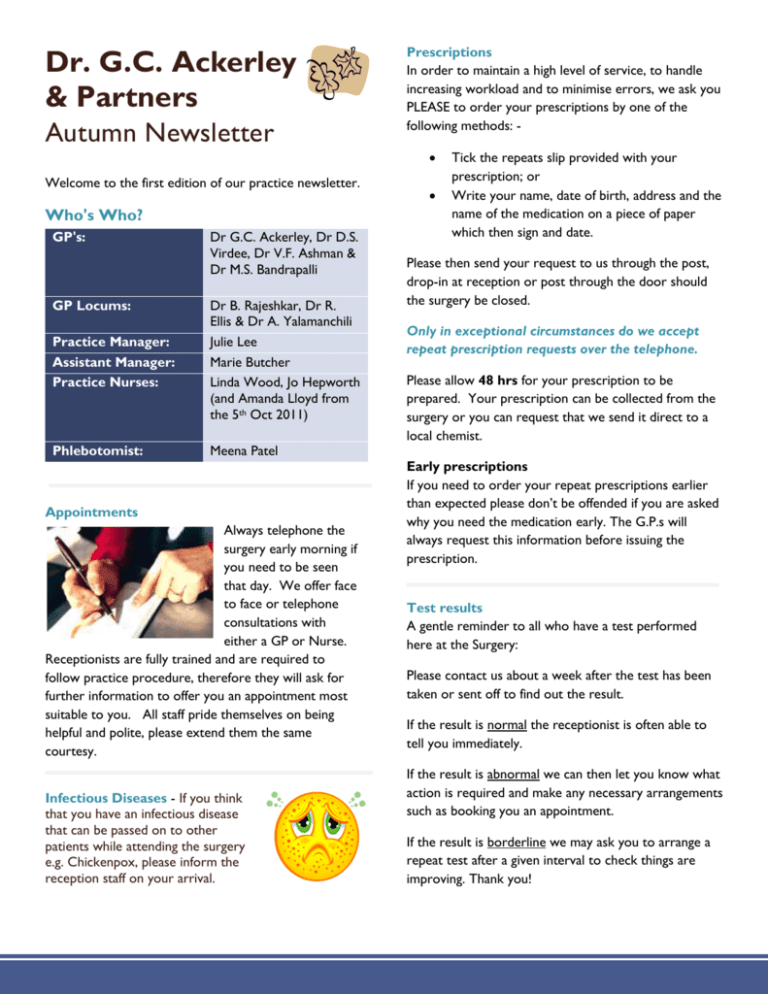
Dr. G.C. Ackerley & Partners Autumn Newsletter Prescriptions In order to maintain a high level of service, to handle increasing workload and to minimise errors, we ask you PLEASE to order your prescriptions by one of the following methods: Welcome to the first edition of our practice newsletter. Who's Who? GP's: GP Locums: Dr G.C. Ackerley, Dr D.S. Virdee, Dr V.F. Ashman & Dr M.S. Bandrapalli Practice Manager: Assistant Manager: Practice Nurses: Dr B. Rajeshkar, Dr R. Ellis & Dr A. Yalamanchili Julie Lee Marie Butcher Linda Wood, Jo Hepworth (and Amanda Lloyd from the 5th Oct 2011) Phlebotomist: Meena Patel Appointments Always telephone the surgery early morning if you need to be seen that day. We offer face to face or telephone consultations with either a GP or Nurse. Receptionists are fully trained and are required to follow practice procedure, therefore they will ask for further information to offer you an appointment most suitable to you. All staff pride themselves on being helpful and polite, please extend them the same courtesy. Infectious Diseases - If you think that you have an infectious disease that can be passed on to other patients while attending the surgery e.g. Chickenpox, please inform the reception staff on your arrival. Tick the repeats slip provided with your prescription; or Write your name, date of birth, address and the name of the medication on a piece of paper which then sign and date. Please then send your request to us through the post, drop-in at reception or post through the door should the surgery be closed. Only in exceptional circumstances do we accept repeat prescription requests over the telephone. Please allow 48 hrs for your prescription to be prepared. Your prescription can be collected from the surgery or you can request that we send it direct to a local chemist. Early prescriptions If you need to order your repeat prescriptions earlier than expected please don’t be offended if you are asked why you need the medication early. The G.P.s will always request this information before issuing the prescription. Test results A gentle reminder to all who have a test performed here at the Surgery: Please contact us about a week after the test has been taken or sent off to find out the result. If the result is normal the receptionist is often able to tell you immediately. If the result is abnormal we can then let you know what action is required and make any necessary arrangements such as booking you an appointment. If the result is borderline we may ask you to arrange a repeat test after a given interval to check things are improving. Thank you! Annual winter ‘flu jabs’ Don’t worry, there’s still some time but we thought you might like to know we’re planning ahead. We will be giving the jabs in the usual fashion in October this year and will start to take bookings in September. This year’s jab is going to contain bits* of 3 viruses: the swine ‘flu virus and two other viruses. Even if you had the swine flu jab you will still need this one so that you’re even better protected for the winter (which could be worse than usual after the pandemic). Unusually, this seasonal jab is also going to be offered to all pregnant mums who didn’t have the swine flu jab when it was available. This is because swine flu seems to affect pregnant women more than normal flu and we are expecting swine flu to reappear this winter. [* yes, the vaccine only contains parts of each virus so it is impossible to catch ‘flu from the vaccine, contrary to popular belief!] Patient Participation Group The first meeting of the practice participation group is due to take place on the 27th Sept 2011 at our Astill Lodge Surgery from 1.30pm to 2.30pm. We are inviting any patients who would like to get involved in improving current services and developing new ones to come along. Please enquire at reception. (There may be limited places.) Thinking of Quitting Smoking? Get help and advice in our Smoking Cessation Clinics held on Friday mornings at both of our surgeries. Please ask at reception for details. How to Manage……… a Sore Throat Sore throat (pharyngitis) is very common. It is usually caused by an infection in the throat. Soreness in the throat may be the only symptom. In addition, you may also have a hoarse voice, mild cough, fever, headache, feel sick, feel tired, and the glands in your neck may swell. It may be painful to swallow. The soreness typically gets worse over 2-3 days and then usually gradually goes within a week. In about 1 in 10 cases the soreness lasts longer than a week. You may also develop a sore throat if you have a cold or flu-like illness. Tonsillitis is an infection of the tonsils at the back of the mouth. Symptoms are similar to a sore throat, but the fever and the general feeling of being unwell may be more severe. You may also be able to see some pus (white spots) on the enlarged red tonsils. So what is the treatment for sore throat and tonsillitis? Not treating – This gives “Mother Nature” a chance and is usually the best option as many throat infections are mild and soon get better. Drink Plenty - It is tempting not to drink very much if it is painful to swallow, however this can lead to mild dehydration (especially if you have a fever). Mild dehydration can make headaches and tiredness much worse. Paracetamol or Ibuprofen - Both medications ease pain, headache, and fever. To keep symptoms to a minimum it is best to take a dose at regular intervals as recommended on the packet of medication rather than 'now and then'. For example, take paracetamol four times a day until symptoms ease. Aspirin gargles - These may ease the soreness. (There is little research evidence that confirms this. However, it is a popular treatment and may be worth a try.) Dissolve some soluble aspirin in water and gargle for 3-4 minutes, 3-4 times a day. Swallow the aspirin after gargling for additional symptom relief, unless you are also taking ibuprofen tablets (in which case, spit out the aspirin after gargling). Children under 16 should NOT have aspirin. Other gargles, lozenges, and sprays that you can buy at pharmacies may help to soothe a sore throat. However, they do not shorten the illness. Do I need an antibiotic? Usually not. Most throat and tonsil infections are caused by viruses, and antibiotics will not kill a virus. Some throat infections are caused by bacteria, however, even if a bacterium is the cause, in most cases an antibiotic does not make much difference to your recovery rate. Your immune system usually clears these infections, bacterial & viral, within a few days. Also, antibiotics can sometimes cause side-effects such as diarrhoea, feeling sick, rash and stomach upsets, therefore, most doctors do not prescribe antibiotics for most cases of sore throat or tonsillitis. An antibiotic may be advised if the infection is severe, if it is not easing after a few days, or if your immune system is not working properly (i.e. if you have had your spleen removed, if you are having chemotherapy, etc). It is very unusual for sore throats to continue beyond 23 weeks so it would be sensible to see your G.P. for symptoms that linger beyond this timescale so that other causes of sore throats can be checked for. Should you require a copy of this Newsletter to take home then please ask at reception.

